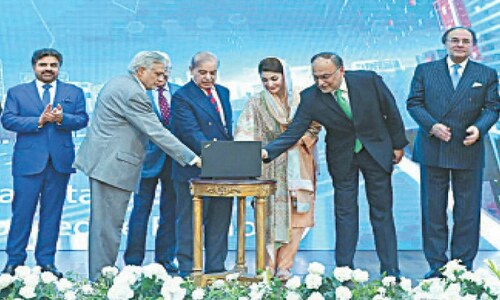LONDON, Dec 8: A number of Pakistani novelists, poets and writers read out pieces from their works here on Friday evening at a two-hour long event organised by the Campaign Against Martial Law (CAML), a group of students, lawyers, doctors, media persons and civil society activists of Pakistan origin.
In line with the theme of the event – Politics and Fiction – Kamila Shamsie (City by the Sea, Salt and Saffron, Kartography and Broken Verses), Mohsin Hamid (Moth Smoke and The Reluctant Fundamentalist), Moni Mohsin (End of Innocence) and Aamer Hussain (Mirror to the Sun, Turquoise, Cactus Town, This Other Salt, Insomnia and Kahan: Short Stories by Pakistani Women) read out pieces from their books.
A portion from Mohammad Hanif’s (BBC Urdu Service) forthcoming book, The Exploding Mangoes, was read out by his wife. Amarjit Chandan (Punjabi poet) and Zubaida Metlo (Sindhi poetess) recited selections from their poems. Saqlain Imam of the BBC Urdu Service read out selected verses from Ghalib and Faiz.
Ghazi Salahuddin, a Pakistani journalist, spoke briefly on the current political developments in Pakistan with special focus on the struggle of the Pakistani bar and the bench against President Musharraf’s rule. During the Q&A session he quoted liberally from Faiz, Jalib and Faraz.
Mohsin Hamid, who was nominated for the Booker Prize this year for his second novel, The Reluctant Fundamentalist, brought the house down as he read out the following portion from his first novel, Moth Smoke:
“There are two social classes in Pakistan, Professor Superb said to his unsuspecting audience,” gripping the podium with both hands as he spoke. “The first group, large and sweaty, contains those referred to as the masses. The second group is much smaller, but its members exercise vastly greater control over their immediate environment and are collectively termed the elite.
“The distinction between members of these two groups is made on the basis of control of an important resource: air-conditioning. You see, the elite have managed to re-create for themselves the living standards of say, Sweden, without leaving the dusty plains of the Subcontinent. They’re a mixed lot — Punjabis and Pathans, Sindhis and Balochis, smugglers and mullahs, soldiers and industrialists — united by their residence in an artificially cooled world.
Although it was late in the evening and rather an extremely chilly one at that, the event turned into a collective condemnation session of President Pervez Musharraf.















































Dear visitor, the comments section is undergoing an overhaul and will return soon.